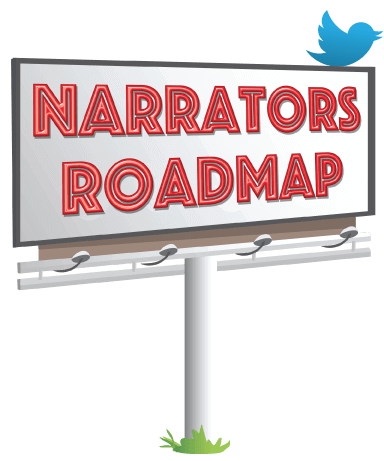Thanks to narrator Travis Baldree for his permission to republish this essay that he originally posted on Facebook.
Hey, so I’ve been doing this for a few years now, and I have some notes that, if you are new, you may find useful.
1) Be nice to everyone.
2) Learn and internalize the best practices before you break or ignore them. The time may COME to break or ignore them, but you’ll know when that is, and it won’t be in your first couple of books. If you think the time is right to do so in your first few months, you’re wrong. You have to know the rules well before you can subvert them.
3) Coaching is not a one-stop shop. You are accruing information. Coach widely. Early on, a lot of this will be best practices that you just need to internalize, but eventually it will start to trend more to individual coaches’ opinions. They will not always agree. That is fine. That doesn’t mean they are wrong. You are gathering this up for your mental mulch pile. As you pass the threshold of competency and start to become skilled, you will start synthesizing this information to accentuate what makes you a singular performer. The ideas will ferment, and they will be of a benefit entirely unique to you. Let it happen naturally.
4) Learn all the parts of the business. That doesn’t mean you have to be proficient. It doesn’t mean you need to be an engineer or a proofer. But know how those things work. Understand the fundamentals of how audio files work. Understand the terms, and the tools. Be cognizant of everything. This will make you not a pain in the ass to work with and will lead to good things. It’s not beneath you, and beyond a certain point, it isn’t a distraction, as it will directly impact the quality of the work you deliver. If you DO decide to become proficient, it will come in handy though. Trust me.
5) Let go of the expectation that there is a specific set of steps or people or publishers that you must interact with to be successful. It’ll happen in a way you don’t expect. Just do excellent work, and continuously improve. And be nice. Always be nice.
6) Be selective of your projects. Be sure you want your name on them. A bad project isn’t worth the stain on your portfolio if you can help it. Stay away from scammy garbage books. If it’s less than 3 hours, royalty share, and has a blank red cover with white text – don’t waste your time on it. If you need to practice to become basically competent, record yourself, and then throw it away. Besides, reading poorly Google-translated text for someone whose motives for publishing the book are inexplicable will not build skills you want to build.
7) Quality is everything. You can overwork anything, but don’t let simple mistakes go out the door with the expectation that someone else will catch them. Be your own best critic first. Other people don’t have time to fix lazy mistakes, which means they’re more likely to make it out into the world. (with your name on them)
8) Listen to other people’s work, especially people you like. You will internalize important lessons that will become a part of your own particular delivery. The more excellent narrators you listen to, the more invisible lessons you will teach yourself, especially if you are paying attention. And you should pay attention. Why does that delivery work? Why is that funny? What about this made me tear up? How are they using their voice to accomplish this? Can I try it? Does it work for me? Why or why not?
9) Vocal practice is important. You want to develop the ability to put your voice where you want it repeatedly. If you can do something repeatedly with similar intonation and quality, then you can do it on demand — which means it can become instinctual. You must build instinct to have an effortless and natural read. Make sure you’re building the right instincts.
10) Identify ‘your people’ as you work with them and cultivate those relationships. People that you like and like to work with. I don’t mean that you should do this in a mercenary fashion — it’s just good for you! But also, these relationships are the invisible underpinning of your career. Don’t stress about it, but find the people you get along with and specifically feed and water those relationships. You will be happier, they will be happier, and good things will come out of it.
11) Learn to cold-read effectively. Practice it. It’s a combination of reading ahead and understanding the rhythm of speech and ‘predicting’ what an author will write before you read it (again on an instinctual level) so that you can intuit where the phrase is going to go. It’s also understanding the musicality of speech, and understanding how to avoid repetitive intonation and musicality while still respecting what the author is trying to do, and keeping it feeling natural. If you enjoy writing and like language, this is a lot easier to do. The better you can cold read, the better your delivery will be (and the faster you will produce work). I cannot overstate how useful this is. Also, it will pay dividends in breathing as well, as you will improve your ability to learn where to place breaths to sound most natural.
If you find yourself reading and discovering that you misunderstood what an author was attempting with a sentence only AFTER you get to the end, try to figure out the signposts in that sentence that would clue you in. This is hard to articulate in a paragraph here, but it’s worth thinking on. Also, it should go without saying, but if you misjudged the intent of a sentence and your take on it doesn’t support the intent, go back and fix it!
12) Learn to compare your work in a useful way. Being a good self critic means being truthful in your assessment without being cruel to yourself. It’s just part of the process, don’t let it hurt you. It’s always good when you can find something to improve and you understand why — that’s wonderful information! If you don’t understand why, or can’t even tell if something is not good, that’s where you get stuck. (And why you need a coach!) If you know something is lacking, then you are forearmed with critical information that will allow you to improve. Work on it, improve it, and move on to the next thing. It’s like sanding down rough wood. Eventually you will be working away at smaller imperfections that other people won’t notice.
13) You are a partner with the author. Understand what they are trying to do, and serve it. Get out and push when you can to make sure that their intent gets across to the listener. All authors fail to achieve their goals sometimes, just as we do. You can be a helping hand when you can recognize the cracks that you can help paper over. Note, that does NOT mean rewriting their work or altering their intent — that means using your performance ability to give a little boost where needed.
14) Learn to effectively tell an author’s jokes. Recognize when they’re being funny, and make sure you get the humor across. This is a great thing to practice over and over to wring out just the right amount of humor and to illustrate to yourself how your performance can really work hand-in-hand with their words. If an author laughs when they hear their own joke, you win.
15) Don’t tell yourself you can’t do something. “I can’t do the other gender’s voices. I can’t do this accent.”
Yeah, you can. It’s just going to take some work.
Don’t settle. You may not ever be done, but you can absolutely improve. Coach. Practice.
16) Don’t let yourself tear down your authors. It’s your job to get on board with the book, to learn to love what you can about it. Find those things and get behind them. If you snark all over a book you are doing, you will begin to fail the author. They won’t all be beautifully written, but delight in the fact that you can elevate them with some hard work.
17) The hardest books will be the worst-written books. That’s OK. They are exercise. They’re whetstones. You are sharpening yourself so that when the amazing books fall into your lap you will be well prepared to absolutely rock them. Bonus: Fewer people listen to the poorly written ones, usually, so you can work slightly out of the spotlight while still getting paid. Challenge yourself to make these books sing to the best of your ability. It can be very satisfying.
18) Some of the books you like least are the ones everyone else seems to love. Again, don’t let yourself fall into the trap of flaking out on things that aren’t your favorite. They may become what you are known best for, so make sure you put forth your best.
19) I hesitate to say this for fear it’ll be taken wrong, but mimicry is a useful learning technique. Listening to performers you admire and mimicking their diction and delivery is (I think) very powerful. You don’t want to do that on a book. But it’s like learning to play an instrument. It’s exercise and, again, putting your voice where you want it. Internalizing lessons about diction, emphasis, emotion. If you do this, do this broadly so that you are adding a variety of ingredients. You’re not trying to channel Jim Dale for your own read, you want to absorb a variety of influences and then adopt little lessons here and there that work for you, while improving your ability to precisely do with your voice what you intend. Most artists copied favorite artists as a child — they don’t draw like those artists now, but they learned important lessons that were incorporated into their own personal style. The same goes for musicians. I think it holds true here as well.
20) When voicing dialogue, I think it is useful to have a mental movie image of what is going on. Where are the characters relative to one another when they are speaking? What are they doing? If one character is coming down the stairs while one awaits them, or they are leaning close across a table toward one another, they might speak the same lines, but they will sound very different. The clearer this image is, and the better it fits the action that the author has described, the richer and more ‘live’ your dialogue delivery will become.
21) If you can’t emote properly with a character voice, don’t do it. If the character can’t sing and tell a joke, you are straining too hard, and you can’t act. If you’re altering your voice, it needs to be comfortable and near effortless or the character will become wooden.
22) Be nice. (again)
Other resources on this topic:
- Vetted coaches are linked in Audiobook Village.








